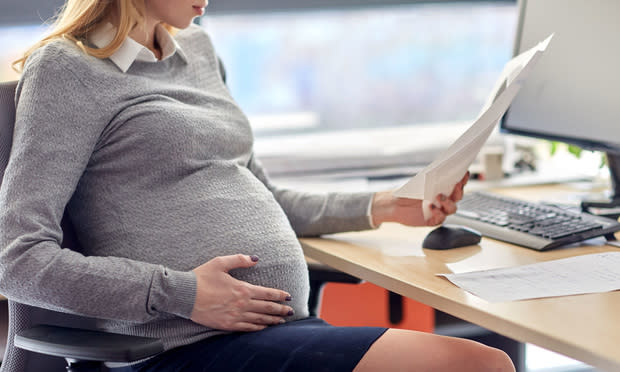CHRO, Yale Law Students Unveil Workplace Guidelines for Pregnant Women

Pregnant businesswoman. Photo: Syda Productions/Shutterstock.com
The Connecticut Commission on Human Rights and Opportunities teamed with law students from Yale University Tuesday afternoon to unveil new pregnancy guidelines for employers and employees.
Organizers joined two state legislators who have worked on the issue of pregnancy rights in the workplace for a press conference at the Legislative Office Building. They said the new guidelines are meant to provide working women with accommodations at work during their pregnancy and when they need to take time off.
The new accommodations include: being permitted to sit or eat while working; more frequent or longer breaks; assistance with manual labor; light duty or desk-duty assignments; modified work schedules, including but not limited to the option to work from home or remotely; moving a workstation to permit the movement or stretching of extremities or to be closer to the bathroom; and time off to attend prenatal or postnatal appointments.
In addition, the new blueprint, which takes effect immediately, also states employees might request a reasonable leave of absence due to a disability resulting from pregnancy. Limitations, the guidelines say, typically give rise to a need for six weeks following a vaginal delivery and eight weeks following a cesarean section. The new guidelines say that "an employee has the right to take more or less of a reasonable leave of absence if needed."
During the 20-minute press conference Tuesday morning, Cheryl Sharp, deputy director of the CHRO, said the guidelines are "helpful in clarifying the rights and responsibilities of employees and employers." If a woman feels her employer is not meeting the updated CHRO requirements, she can file a complaint with the commission.
"Every employer should know that they can't discriminate against an individual because they are part of a protected class," Sharp said. "Civil rights is good for business."
State Sen. Mae Flexer, D-Danielson, attended the press conference along with her colleague, State Rep. Caroline Simmons, D-Stamford.
"Connecticut has some of the strongest laws in the country," Flexer said Tuesday. "Employers should make accommodations for pregnant women so they can continue to work while pregnant and make sure those around them will be respectful to them."
Yale students helped write the new pregnancy accommodation guidelines as one of the projects they undertake in the school's law clinics.
While many practicing attorneys believe Connecticut is ahead of the curve when it comes to work accommodations for pregnant women, some employment experts said the added protections are still very needed.
"The efforts to add some protections shows that employers are still probably not doing enough and sometimes need to be prodded a little bit," said observer Steve Bourtin, who heads the Connecticut offices of The Boyd Law Group. "A new mother's medical or lifestyle issues will not be alleviated just by giving them time off. They need extra accommodations once they are able to return to work and also while they are working while pregnant. I do certainly think the protections are warranted."


